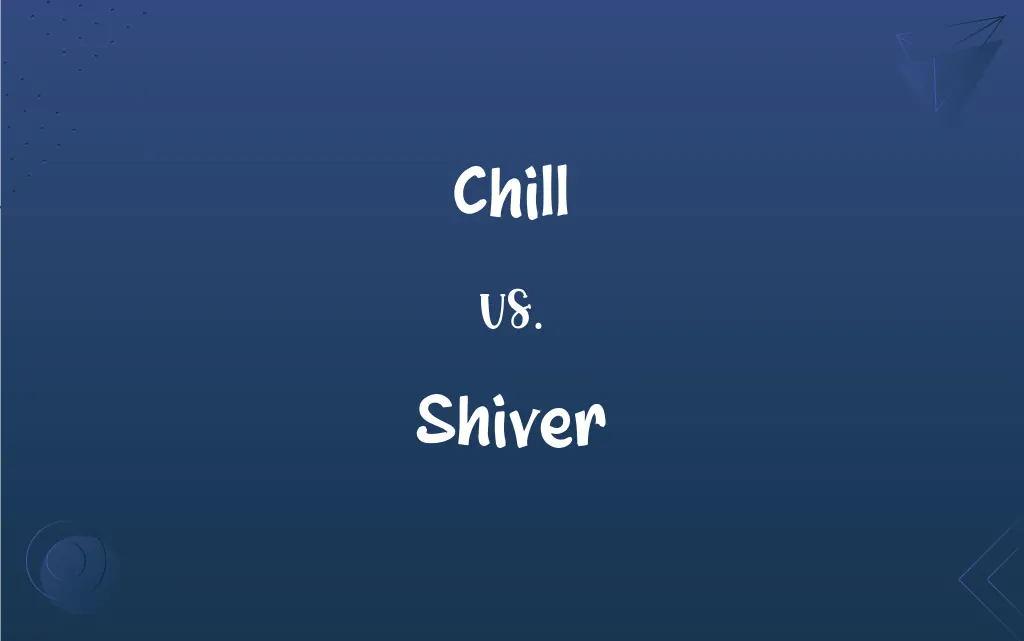Chill vs. Shiver: What's the Difference?
Edited by Harlon Moss || By Janet White || Updated on October 5, 2023
Chill refers to a cold feeling or a relaxed state, while shiver is an involuntary shaking due to cold or emotion.

Key Differences
Chill and shiver, while related, encompass differing nuances and applications within the English language. Chill primarily refers to a moderate but penetrating coldness, often causing a feeling of discomfort. It can also refer to a relaxed or untroubled state of mind or being. For example, one might feel a chill when a cold breeze blows, or one might chill on the sofa after a long day, enjoying a moment of relaxation and peace.
Shiver denotes a more physiological response, an involuntary movement involving alternate contractions and relaxations of adjacent muscular fibers, often as a reaction to coldness or fear. A shiver usually encompasses a more intense and uncontrollable physical manifestation compared to a chill, often illustrating a more acute response to external stimuli. For instance, one might shiver uncontrollably while walking in freezing temperatures or during a moment of intense fear.
These words, although parallel in certain aspects, notably differ in their usage and connotations. Chill conveys a more versatile understanding, signifying either a physical sensation of coldness or a casual, calm demeanor or atmosphere. This versatility allows it to be used in various contexts, describing both physical sensations and states of being.
Conversely, shiver typically pertains more to the physical realm, depicting a distinct, involuntary bodily reaction. It predominantly symbolizes a human body’s response to cold temperatures or heightened emotions, portraying a momentary lapse in one’s control over their body due to external influences. Shiver conveys an immediacy and intensity not always present in the use of chill.
In summary, the nuanced distinction between chill and shiver lies in the range of their meanings and the intensity of the sensations or states they depict. Chill possesses a broader application with dual roles in portraying both a mild physical discomfort due to cold and a relaxed state of being. Shiver, on the other hand, predominantly illustrates a more acute and involuntary physical response to cold or emotional stimuli.
ADVERTISEMENT
Comparison Chart
Definition
A feeling of coldness, as well as a relaxed state or demeanor.
Involuntary shaking due to coldness or strong emotion.
Usage
Can describe a physical sensation or a state of being.
Primarily describes a physical reaction.
Intensity
Moderate and can be pleasant or uncomfortable.
More intense and usually uncomfortable.
Context
Physical and social.
Mostly physical.
Connotations
Can be neutral, positive, or negative depending on context.
Primarily negative.
ADVERTISEMENT
Chill and Shiver Definitions
Chill
A sensation of coldness.
I felt a chill when I stepped outside in the frosty air.
Shiver
A small fragment or splinter.
The ground was covered in shivers of broken glass.
Chill
A relaxed or nonchalant attitude or atmosphere.
We had a chill evening, just watching movies and eating popcorn.
Shiver
An instance of rapid vibration of the body and teeth chattering due to cold.
The freezing wind caused a shiver to run through my whole body.
Chill
A moderate but penetrating coldness.
Shiver
A feeling of fear or revulsion.
The haunted house story sent a shiver down my spine.
Chill
A sensation of coldness, often accompanied by shivering and pallor of the skin.
Shiver
To shake or tremble, as from cold or fear.
Chill
A checking or dampening of enthusiasm, spirit, or joy
Bad news that put a chill on the celebration.
Shiver
To quiver or vibrate, as by the force of the wind.
Chill
A sudden numbing fear or dread.
Shiver
To cause (a sail) to flutter by sailing too close to the wind.
Chill
Moderately cold; chilly
A chill wind.
Shiver
To break into fragments or splinters; shatter.
Chill
Not warm and friendly; distant
A chill greeting.
Shiver
To cause to break suddenly into fragments or splinters.
Chill
Discouraging; dispiriting
“Chill penury repressed their noble rage” (Thomas Gray).
Shiver
An instance of shivering or trembling.
Chill
(Slang) Calm or relaxed
“As my meditation routine grew more stable...my already laid-back demeanor grew positively chill” (David Gelles).
Shiver
Shivers An attack of shivering. Used with the.
Chill
To affect with or as if with cold.
Shiver
A fragment or splinter.
Chill
To lower in temperature; cool.
Shiver
To tremble or shake, especially when cold or frightened.
They stood outside for hours, shivering in the frosty air.
Chill
To make discouraged; dispirit.
Shiver
To cause to shake or tremble, as a sail, by steering close to the wind.
Chill
(Metallurgy) To harden (a metallic surface) by rapid cooling.
Shiver
To break into splinters or fragments.
Chill
To be seized with cold.
Shiver
The act of shivering.
A shiver went up my spine.
Chill
To become cold or set
Jelly that chills quickly.
Shiver
(medicine) A bodily response to early hypothermia.Wp
Chill
(Metallurgy) To become hard by rapid cooling.
Shiver
A fragment or splinter, especially of glass or stone.
Chill
To calm down or relax. Often used with out.
Shiver
A thin slice; a shive.
Chill
To pass time idly; loiter.
Shiver
(geology) A variety of blue slate.
Chill
To spend time with someone in a relaxed manner; hang out together.
Shiver
(nautical) A sheave or small wheel in a pulley.
Chill
A moderate, but uncomfortable and penetrating coldness.
There was a chill in the air.
Shiver
A small wedge, as for fastening the bolt of a window shutter.
Chill
A sudden penetrating sense of cold, especially one that causes a brief trembling nerve response through the body; the trembling response itself; often associated with illness: fevers and chills, or susceptibility to illness.
Close the window or you'll catch a chill.
I felt a chill when the wind picked up.
Shiver
A spindle.
Chill
An uncomfortable and numbing sense of fear, dread, anxiety, or alarm, often one that is sudden and usually accompanied by a trembling nerve response resembling the body's response to biting cold.
Despite the heat, he felt a chill as he entered the crime scene.
The actor's eerie portrayal sent chills through the audience.
His menacing presence cast a chill over everyone.
Shiver
Collective noun for a group of sharks
Chill
An iron mould or portion of a mould, serving to cool rapidly, and so to harden, the surface of molten iron brought in contact with it..
Shiver
One of the small pieces, or splinters, into which a brittle thing is broken by sudden violence; - generally used in the plural.
Chill
The hardened part of a casting, such as the tread of a carriage wheel.
Shiver
A thin slice; a shive.
Of your soft bread, not but a shiver.
Chill
A lack of warmth and cordiality; unfriendliness.
Shiver
A variety of blue slate.
Chill
Calmness; equanimity.
Shiver
A sheave or small wheel in a pulley.
Chill
A sense of style; trendiness; savoir faire.
Shiver
A small wedge, as for fastening the bolt of a window shutter.
Chill
Moderately cold or chilly.
A chill wind was blowing down the street.
Shiver
A spindle.
Chill
Unwelcoming; not cordial.
Arriving late at the wedding, we were met with a chill reception.
Shiver
The act of shivering or trembling.
Chill
(slang) Calm, relaxed, easygoing.
The teacher is really chill and doesn't care if you use your phone during class.
Paint-your-own ceramics studios are a chill way to express yourself while learning more about your date's right brain.
Shiver
To break into many small pieces, or splinters; to shatter; to dash to pieces by a blow; as, to shiver a glass goblet.
All the groundWith shivered armor strown.
Chill
(slang) "Cool"; meeting a certain hip standard or garnering the approval of a certain peer group.
That new movie was chill, man.
Shiver
To separate suddenly into many small pieces or parts; to be shattered.
There shiver shafts upon shields thick.
The natural world, should gravity once cease, . . . would instantly shiver into millions of atoms.
Chill
(slang) Okay, not a problem.
Sorry about that. —It's chill.
Shiver
To tremble; to vibrate; to quiver; to shake, as from cold or fear.
Prometheus is laidOn icy Caucasus to shiver.
The man that shivered on the brink of sin,Thus steeled and hardened, ventures boldly in.
Chill
(transitive) To lower the temperature of something; to cool.
Chill before serving.
Shiver
To cause to shake or tremble, as a sail, by steering close to the wind.
Chill
(intransitive) To become cold.
In the wind he chilled quickly.
Shiver
Reflex shaking caused by cold or fear or excitement
Chill
To harden a metal surface by sudden cooling.
Shiver
An almost pleasurable sensation of fright;
A frisson of surprise shot through him
Chill
To become hard by rapid cooling.
Shiver
Tremble convulsively, as from fear or excitement
Chill
To relax; to lie back.
Chill, man, we've got a whole week to do it; no sense in getting worked up.
The new gym teacher really has to chill or he's gonna blow a gasket.
Shiver
Shake, as from cold;
The children are shivering--turn on the heat!
Chill
To "hang", hang out; to spend time with another person or group.
Hey, we should chill this weekend.
Shiver
An act of shaking or trembling due to cold or fear.
I couldn’t stop the shiver when I touched the icy water.
Chill
To smoke marijuana.
On Friday night do you wanna chill?
Shiver
An involuntary muscle contraction due to the body’s response to the cold.
A sudden shiver reminded me to zip up my jacket in the snowy weather.
Chill
To discourage, depress.
Censorship chills public discourse.
Chill
A moderate but disagreeable degree of cold; a disagreeable sensation of coolness, accompanied with shivering.
Chill
A sensation of cold with convulsive shaking of the body, pinched face, pale skin, and blue lips, caused by undue cooling of the body or by nervous excitement, or forming the precursor of some constitutional disturbance, as of a fever.
Chill
A check to enthusiasm or warmth of feeling; discouragement; as, a chill comes over an assembly.
Chill
An iron mold or portion of a mold, serving to cool rapidly, and so to harden, the surface of molten iron brought in contact with it.
Chill
The hardened part of a casting, as the tread of a car wheel.
Chill
Moderately cold; tending to cause shivering; chilly; raw.
Noisome winds, and blasting vapors chill.
Chill
Affected by cold.
Chill
Characterized by coolness of manner, feeling, etc.; lacking enthusiasm or warmth; formal; distant; as, a chill reception.
Chill
Discouraging; depressing; dispiriting.
Chill
To strike with a chill; to make chilly; to cause to shiver; to affect with cold.
When winter chilled the day.
Chill
To check enthusiasm or warmth of feeling of; to depress; to discourage.
Every thought on God chills the gayety of his spirits.
Chill
To produce, by sudden cooling, a change of crystallization at or near the surface of, so as to increase the hardness; said of cast iron.
Chill
To become surface-hardened by sudden cooling while solidifying; as, some kinds of cast iron chill to a greater depth than others.
Chill
Coldness due to a cold environment
Chill
An almost pleasurable sensation of fright;
A frisson of surprise shot through him
Chill
A sensation of cold that often marks the start of an infection and the development of a fever
Chill
A sudden numbing dread
Chill
Depress or discourage;
The news of the city's surrender chilled the soldiers
Chill
Make cool or cooler;
Chill the food
Chill
Loose heat;
The air cooled considerably after the thunderstorm
Chill
Uncomfortably cool;
A chill wind
Chilly weather
Chill
An unpleasant shivery feeling.
A sudden chill ran down my spine when I heard the eerie noise.
Chill
The act of calming down or relaxing.
I need to chill before I can discuss this calmly.
FAQs
Does chill always refer to a physical feeling?
No, chill can also refer to a relaxed state of being or atmosphere.
Is shiver always due to cold?
No, shiver can also be due to fear or other strong emotions.
Can shiver be controlled?
Shivering is generally an involuntary response and is difficult to control.
Is shiver used metaphorically?
Yes, shiver can be used metaphorically to describe a feeling of fear or revulsion.
Can chill have positive connotations?
Yes, chill can have positive connotations when referring to a relaxed or laid-back attitude or atmosphere.
Can chill refer to a demeanor?
Yes, chill can describe a relaxed or nonchalant demeanor or attitude.
Can you describe an environment as chill?
Yes, a chill environment typically refers to a relaxed and laid-back atmosphere.
Can you use chill to describe a person?
Yes, describing someone as chill usually implies they are relaxed or easygoing.
Can a shiver be momentary?
Yes, a shiver can be a momentary, rapid vibration of the body.
Can the phrase “a chill in the air” refer to an uneasy atmosphere?
Yes, “a chill in the air” can metaphorically refer to a sense of unease or tension in the atmosphere.
Can chill mean to relax?
Yes, to chill can mean to relax or to be in a relaxed state.
Is shiver a reaction to external stimuli?
Yes, shivering is a reaction to external stimuli such as cold or emotional distress.
Can shiver refer to a fragment?
Yes, shiver can also mean a small fragment or splinter of an object.
Is shiver always negative?
Shiver often has negative connotations, typically associated with discomfort, but the context can change the interpretation.
Can you chill food?
Yes, to chill food means to make it cold by placing it in a refrigerator or cooler.
About Author
Written by
Janet WhiteJanet White has been an esteemed writer and blogger for Difference Wiki. Holding a Master's degree in Science and Medical Journalism from the prestigious Boston University, she has consistently demonstrated her expertise and passion for her field. When she's not immersed in her work, Janet relishes her time exercising, delving into a good book, and cherishing moments with friends and family.
Edited by
Harlon MossHarlon is a seasoned quality moderator and accomplished content writer for Difference Wiki. An alumnus of the prestigious University of California, he earned his degree in Computer Science. Leveraging his academic background, Harlon brings a meticulous and informed perspective to his work, ensuring content accuracy and excellence.































































